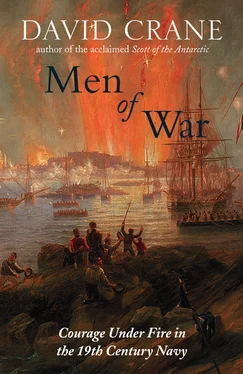If nothing else, the attack offered Hastings the chance at last to satisfy the enormous expectations that had surrounded the Karteria since her arrival in Greece three months before. ‘All the world, men, women, children, old young, black and white, are coming on board to see the steamboat,’ Samuel Gridley Howe, the Karteria ’s new American doctor and one of the nineteenth century’s greatest reforming philanthropists, had recorded in his November journal.
We have two Englishmen [officers], one German, one Frenchman, and one Greek; the Greek is the eldest son of Tombazi. Captain Hastings is a man who deserves the deepest gratitude and respect from the Greek nation. It is only through his exertion, his activity, and generosity, that this ship was ever got out. She was built under his own eye in London, and carries as much weight of metal as a thirty-six gun frigate; her engine, however, is not of the best. Captain Hastings, having on board about forty English and forty Greek sailors, is all ready to join the Greek fleet and engage the enemy. He sees the eyes of the whole people turned upon him – they are tired of waiting for Lord Cochrane and the rest of the vessels. Captain Hastings finds himself obliged to attempt something alone, and I doubt not, from his character, he will succeed or perish with the vessel. ‘Tell Captain Hastings,’ said Commodore Hamilton to me, ‘that I honour and envy him for what others pity him: his situation is perilous, nay almost desperate, yet so glorious is the attempt that were I without wife or children, I would give £1,000 to be in it.’ … How my spirit springs with joy at being on our way to meet the haughty Turk. And though our fate is uncertain, it cannot be an inglorious one. To be engaged in something active and important, in so glorious a cause, in such consecrated regions, makes my heart beat with a wild enthusiasm, which to my sober senses seems boyish and romantic.
Over the next two months an endless stream of mechanical problems with engine, paddles, boilers, leaks, coal, guns and shells – the shells would not explode and all but one of the cannon were damaged by the shock of the charge needed to throw a sixty-eight-pound ball – dampened Howe’s enthusiasm, but on 22 January 1827 the crew at last learned that the Karteria was to see action. ‘Even at this moment the Greeks are struggling to repel the attacks of the Turkish hordes which surround the sacred city,’ an excited Howe wrote as six days later the Karteria slipped unnoticed through the narrow western straits between Salamis and Megara – the first man-of-war since ancient times to effect the passage,
but doubtless the sight of our vessel comforted them, and let them know that assistance was at hand. About 11 A.M. our engine got completely out of order, and there being not a breath of wind to break the glassy smoothness of the sea, we lay motionless; but in what a spot, and with what objects around us! I could not regret the delay which afforded me such a scene. Behind lay Aegina, with its slope to the sea, richly cultivated and interspersed with olives, while farther back rose its hills, crowned by the temple of Jupiter Pluvious, whose still standing columns were plainly to be seen. To the right lay Attica, stretching south and terminating by Sunium; high up was Athens, its Acropolis and Parthenon rising above the mist which floated over the town; Salamis was before us; to the left the Isthmus of Corinth, above which rose the ragged, almost perpendicular Acro Corinth, crowned by its fortress.
The potential fly in the philhellene ointment was as ever the modern Greek soldier, and Gordon’s battle plan was peculiarly designed to bring out all his defects. He had already shown more than once what a different proposition he was among the mountains of the Morea, but as if no one had learned anything in the course of five years of war, the attack on Athens again required him to face the enemy infantry and cavalry out in the open.
At the beginning of February a force under the fat and bejewelled Cephalonian Bonapartist Colonel Bourbaki was landed at Eleusis, and two days later, on the afternoon of the fifth, Gordon’s troops began to embark in the small flotilla of boats that were to ship them across to the mainland. Colours were blessed, saints invoked, and on board the Karteria , Gordon, his second-in-command, the Bavarian Colonel Heideck and the Greek leaders met Hastings to finalise arrangements. ‘The moon shone bright and clear,’ Howe noted, and after all ‘the infernal delays of the Greeks’, everything at last
promised to favour our enterprise … About ten the vessels were all despatched in advance, and at eleven we got under way with steam, and moving on rapidly soon overtook the little fleet, which had but a light breeze. Off the Piraeus, having passed all the vessels, we took a turn backward, sailed around then, and again took the lead. The scene was exceedingly fine, – the night still and clear, a slight breeze filling the sails of our little fleet, which lay about us in every direction; the camp fires of the Greeks under Vashos and Bourbakis upon the sides of the mountains; while from time to time the launching of bombs from the enemy’s batteries into the Acropolis marked the horizon with a long streak of fire, and showed that the siege was still hotly pressed.
By three in the morning the moon had gone, and in a night black enough to mask her approach, the Karteria anchored at Phaleron and the first of Gordon’s 2,300 men were rowed silently ashore. The object of this first wave was the heights immediately above the landing place, but a sudden outbreak of musket fire and ‘wild shouting’ from the ridge – almost certainly a Greek feu de joie to celebrate that they still had their heads on their shoulders – was enough to panic a dubious Gordon into thinking they had been thwarted. ‘“The Turks are there! Our men will be cut to pieces! Back to the boats and take them off,”’ an indignant Howe wrote. ‘These were the words of Colonel Gordon, leader of the expedition, who seemed to be agitated and surprised. Others [were] more cool, particularly Captain Hastings and Colonel Heideck, who besought him calmly to consider whether he should not, instead of re-embarking, proceed to send more men to their assistance.’
The bolder counsel prevailed, and by the end of the night the heights of Munychia had been consolidated, with a traditional line of earth and stone tambouris stretching out over a distance of eleven or twelve hundred yards. In the early hours of the next morning the first of Gordon’s artillery pieces were dragged up from the beach, and to a ‘tremendous feu-de-joie of artillery and musketry’ from the Acropolis and an answering salvo from Gordon’s guns on the heights, the Karteria steamed around the headland and through the narrow harbour entrance of the Piraeus to engage the Turkish centre in the monastery of St Spiridon.
In half an hour the Karteria had dropped anchor, and from a distance of about four hundred yards, firing for the first time with the massive weight of her sixty-eight-pound guns, had soon reduced whole sections of the monastery to little more than rubble. ‘Two thousand men [had] stood regarding us with idle applause,’ Howe wrote, beside himself at the memory of the fancifully styled ‘300’ assault force staying firmly behind their tambouris when their time came,
but came down not. Such complete cowards are they that they will never attack an enemy who is sheltered in such a way as to make an attack in the least dangerous … No, not they! They expected our ship to march upon the land, enter the monastery, and drive out the enemy. Cowards I always knew them to be, and have often seen them show themselves, but never in a more shameful manner than to-day. In fact, my prediction will be accomplished: the country is too open for Greeks to fight in. At ten, we hoisted anchor and came just outside of the Piraeus, in order to prevent being caught by the enemy’s bringing down cannon and placing it upon the entrance of the port, which is not more than fifty yards across.
Читать дальше











